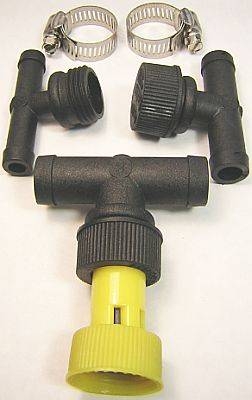
The cooling system of a typical automobile will require periodic flushing to remove contaminants and ensure the longevity of the car. It is recommended that the system be bled thoroughly every 50,000 miles, or the manufacturer's recommended intervals. The average backyard mechanic will spend about an hour bleeding the coolant system.
Drain the coolant from the radiator. There is typically a drain plug on the lower corner of the radiator. Removing it will release the vacuum and allow the coolant to drain into the drain pan.
Connect the coolant flush kit adapters to the upper heater hose. There are two sizes in the kit, and they splice into the heater hose on the top of the engine. Cut the hose in the center, and attach the T-shaped fitting to each end of the cut hose with a hose clamp. The plastic of this piece can be weak, so do not tighten too much.
Tighten the drain plug on the radiator.
Attach a garden hose to the adapter using the yellow fitting provided, and turn the water on slowly. Too much pressure will damage the engine, so just a quarter turn or less will give enough pressure to bleed the system. The radiator cap, still unscrewed, will be the primary exit point for the fluid in the coolant system, so align the drain pan accordingly.
Allow a few minutes for the water to flush the system completely. The fluid will turn clear when the water reaches the radiator cap. Give a few more minutes to ensure all of the coolant is evacuated.
Turn off the water and remove the garden hose from the adapter. The kit comes with a cap for the adapter, making it a permanent fixture on the car for later flushing.
Replace the radiator cap, then run the car for five minutes. This will remove the pockets of coolant still trapped in the crevices of the engine. Turn the heater on full, to get out the coolant still in the heater core.
Shut off the car, and let it cool. Drain the radiator again, and repeat the process of flushing the system with the garden hose. More contaminants will be visible in the drained water. Repeat the flushing procedure until the water coming out is totally clean.
Replace the cap on the adapter, and drain the radiator one last time. Fill the radiator with coolant, not mixed with water, until it is full. Check the level on the reservoir overflow tank, and fill to proper level.
Run the car for 10 minutes to mix the coolant with the water inside the engine. Check the overflow tank for several days and fill to the proper level, as there will be pockets of air that will be forced out while the car is driven.